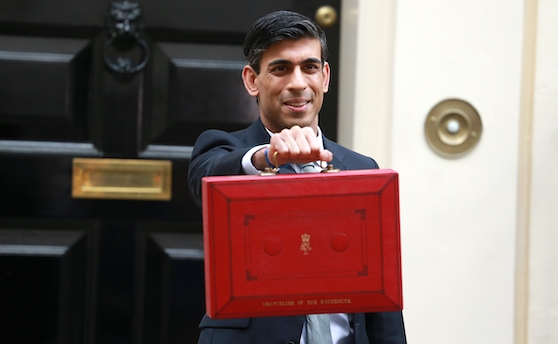
What to expect from Chancellor's Spring Statement today

The advice sector has made a number of predictions about what could be included in today’s Spring Statement.
At around 12.30pm, Chancellor Rishi Sunak will rise to his feet to make his Spring Statement in the Commons.
The statement, which is not a Budget, is traditionally not a time for the announcement of any major changes but industry commentators are expecting more given the global upheaval and pressing economic challenges.
Some believe this Spring Statement could be an outlier with some large changes predicted.
Jason Hollands, managing director of Tilney Smith & Williamson’s platform business Bestinvest, said there could be some substantial announcements in the Statement given the perils faced by UK household finances.
Mr Hollands said a rise in the threshold at which workers start to pay National Insurance - to soften the impact of the imminent NI rate hike - could be on the cards.
He said: “We know already that a 1.25% National Insurance hike is arriving in the new tax year on 6 April. The economic mood music is swinging behind a fiscal boost – but both he (Rishi Sunak) and Boris (Johnson) have stated they are sticking to their guns on the Health and Social Care Levy. And let’s not forget that the Government will both be under pressure to raise wages in the public sector, as well as increase defence spending in response to the war in Ukraine.”
Shaun Moore, tax and Financial Planning expert at Quilter, said he expects Mr Sunak to “splash some cash” as to help deal with the cost of living crisis which has seen CPI and fuel costs soar.
He said: “One option would be to expand the previously announced energy support package. The measures already announced cover around half the increase in domestic energy costs, so if the Chancellor wanted to expand the scheme to offset half the £43bn increase in costs, it would cost an additional £12.5bn, on top of the £9bn already announced. This is extremely expensive, and actually might not target those households most in need. Instead, the Chancellor may uprate benefits by an amount greater than the 3.1% currently pencilled in. The IFS estimates this would cost an additional £9bn for the Exchequer. Moderately cheaper and more targeted, but middle-income households may feel they’ve been left out in the cold.
“A final option could be to look at VAT on energy supplies, including fuel. The IFS estimates that reducing VAT down to zero on domestic fuel would cost £2.4bn, so a significantly cheaper option, but it would be very broad-brushed and not targeted. The Chancellor has already ruled out a reduction in VAT on energy bills for precisely that reason.
“No choice is easy, and no choice is cheap. Whichever option the Chancellor chooses, it will not completely offset the increase in energy costs. Expect political tensions to rise considerably over the following months.”
Laith Khalaf, head of investment analysis at AJ Bell, said Mr Sunak should get a budget windfall in the forthcoming Spring Statement, enabling him to take action against the rising costs of living faced by UK households.
He said: “As we head towards the Spring Statement, higher than expected tax receipts will open up some fiscal space for the Chancellor to provide UK households with some help to manage the rising cost of living. Government borrowing so far this year is £25.9 billion below the last official OBR forecast, and half the level it stood at last year, at ‘only’ £138.4 billion.
“Inflation has helped propel tax receipts higher, on top of a recovery from the lockdown economy of the previous financial year. VAT receipts are £23.8 billion bigger this year, a result of higher prices in the shops, and revived consumer activity, combined with a rise in VAT for hospitality businesses. Fuel duty has brought in an extra £4.5 billion so far this year, which is no doubt why it might be targeted by the Chancellor as a way to alleviate pressure on household budgets. The government is clawing in more money from income tax and National Insurance too, and these receipts are set to be turbo-charged from April when income tax allowances are frozen and National Insurance rates rise.”
A sceptical Sarah Coles, senior personal finance analyst at Hargreaves Lansdown, said any changes announced by Mr Sunak in the Statement would unlikely to make much of a difference.
She said: “At this stage, people will welcome any help at all in the desperate struggle to make ends meet. Unfortunately, the changes reported so far won’t be enough to make a profound difference to the challenge millions of people are set to face.”
From Financial Planning Jobs. For more click on any job.
-
Financial Planner - home based/UK wide - £60k+
Financial Planning Jobs Read more... -
Financial Adviser - London/South East - To £70k
Financial Planning Jobs Read more... -
Senior Financial Adviser - £65k-£75k - Bucks
Financial Planning Jobs Read more...
This is a selection of jobs from our new Financial Planning Jobs site - for more job vacancies click on any job or the link below.
Financial Planning Jobs https://jobs.financialplanningtoday.co.uk/
